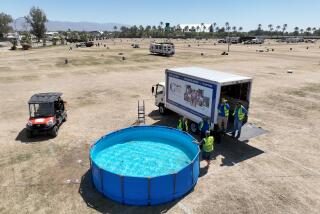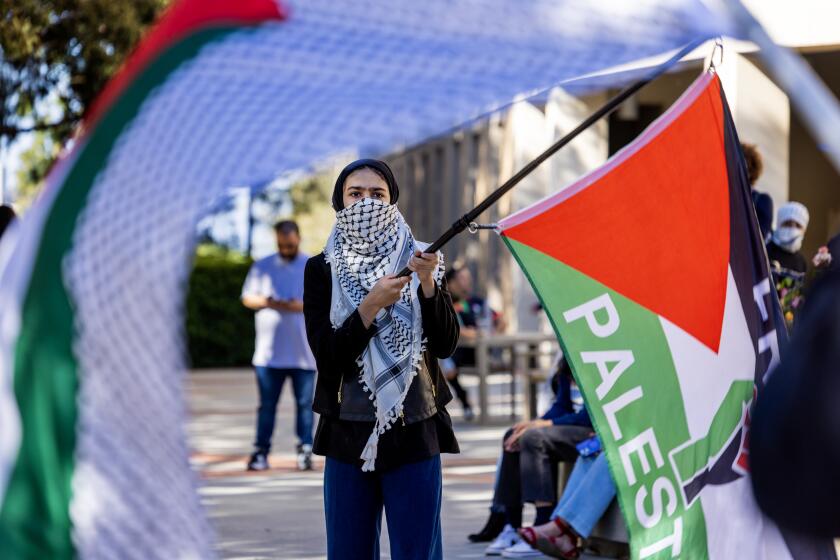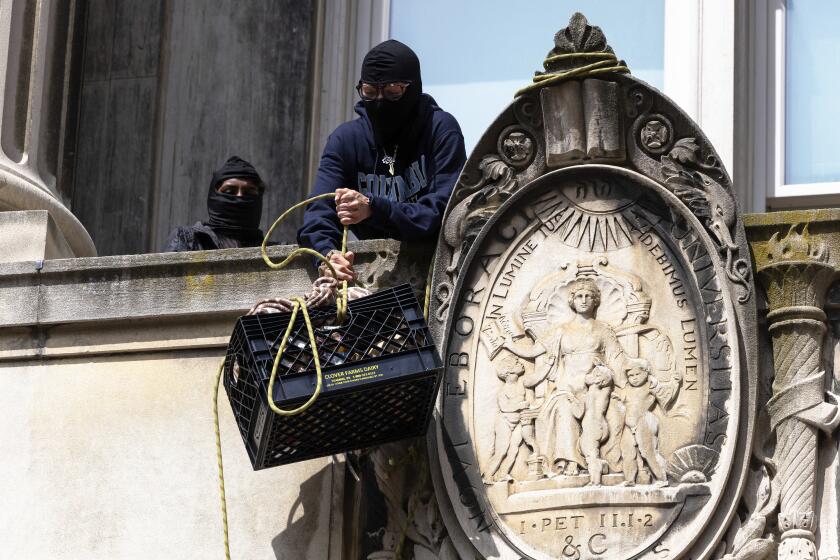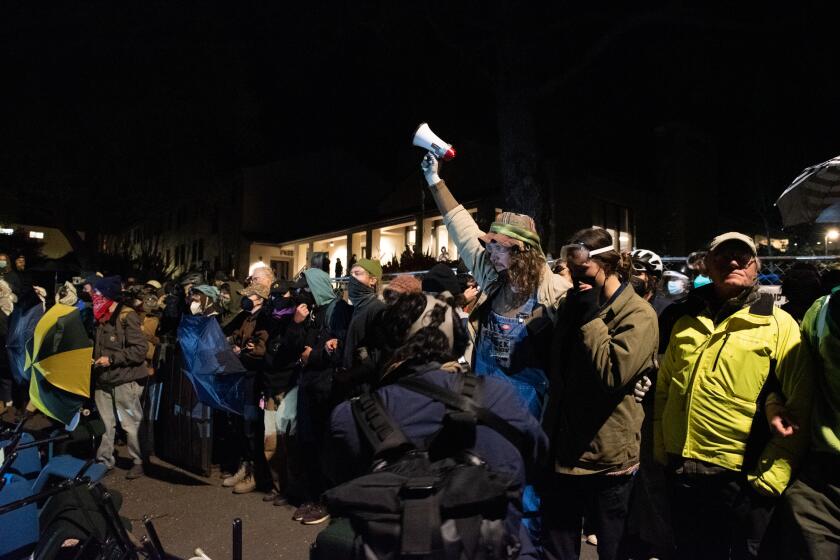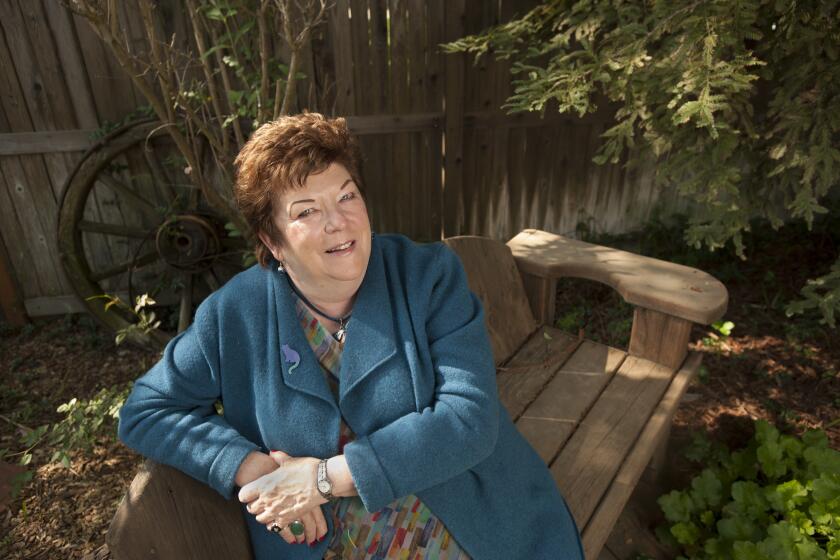Frightened Students Try to Make Sense of Unrest : Schools: Lesson plans shift to discussion of verdicts and rioting. Classes are canceled at many campuses and attendance is sparse at others.
Angry, frightened and most of all bewildered, children throughout Los Angeles are trying to make sense of the dramatic series of events that began with the acquittals in the Rodney G. King case and have mushroomed into widespread violence.
Most children living in the riot-torn neighborhoods of South Los Angeles were kept out of classes Thursday, as schools were closed and bus service was halted because of safety concerns.
In Los Angeles city schools outside of the area, attendance was reported to be down by about 30%--in part because parents, fearful that the violence might spread, kept their children at home. Suburban children, alarmed by the images on television, pleaded with their parents to stay home with them rather than go to work.
All day, curious youngsters congregated on street corners in inner-city neighborhoods, watching as buildings burned and recalling the terror that began the evening before when gunfire and looting erupted.
Standing in front of the Paradise Funeral Home near 52nd Street and Broadway, Licette Hernandez, 11, clutched her sides and watched wide-eyed as firefighters tried for the third time in less than 24 hours to extinguish a fire across the street at Muebles Fashion Fair Furniture.
“I’m scared of all of this. My stomach hurts. It’s been hurting since last night when my dad didn’t come home until midnight. My mother was desperate. Black people were running in the street screaming ‘Rodney King! Rodney King!’ ”
A few blocks north on Broadway, Devincar Ltoe, 17, was angry at police who were looking for stolen goods. He had been thrown up against a wall and searched, a shotgun stuck in his face.
Using a string of profanities to describe what the police had just done to him and what they had done to King more than a year ago, Ltoe said: “I wouldn’t beat no dog the way they beat him. A mama wouldn’t even abuse her child they way they abused him.”
Closer to downtown, only about 20 of 200 students, mostly blacks and Latinos, showed up at Metropolitan High School on 7th and Wilson, in an industrial area of downtown Los Angeles.
They, too, were angry and scared. Rather than try to concentrate on schoolwork, the students sat in front of a large television set watching events unfold in their neighborhoods. When their teachers and principal pressed them for their views of the situation, many students fell silent; others laughed nervously.
Gloria Burgos, 17, one of the few to speak up, labeled the entire King affair as “unfair.”
“The verdicts were clearly racist,” she said. “The police acted wrong. You can see it on the video. Some day I want to be a police officer to make others think the way I do.”
Armando Ibarra, 16, said he was angered about the verdicts, but also disturbed by the rioting.
“I think the people are dumb to be doing this in their own neighborhoods,” he said. “They are only hurting themselves. If they are going go do something, they ought to go burn Beverly Hills or Simi Valley.”
Another student, who said he was a member of a Central-American gang known as Crazy Riders, predicted that is precisely what would happen.
“There’s going to be a big war like in Salvador,” the 17-year-old said. “Because what’s going on is that the big gangs, the Bloods and the Crips, are really going to start going after each other. There is going to be a lot of killing. I don’t think we’ll be able to stop it.”
Miles away, in a community seemingly remote from the violence, teachers at Sherman Oaks Center for Enriched Studies were trying to carry on with their regular lesson plans as much as possible. The principal began the day by directing homeroom teachers to talk about the events with students and to be sure students’ viewing of the days’ events on television was accompanied by class discussion.
“We didn’t want them to be swayed by the images on television,” Assistant Principal John L. White said. “I don’t think the gravity of the situation has sunk in for most students who are here today, because they don’t live in the area. I don’t see any anxiety or fear, but we are getting a lot of questions.”
Across town at Hamilton High near West Los Angeles, fewer than 400 of the school’s 2,200 students showed up, and most of those left campus before the day ended. A steady stream of parents, alarmed by the images of spreading violence, retrieved their children from classes and took them home.
“There’s no doubt, parents are frightened,” said Carol Turley, a Westside mother of six, who sent her children to school armed with reassurances that they would be safe.
“My husband and I talked with them at breakfast, trying to help them understand and put this all in perspective,” she said.
“I think they’re confused as to why the system worked the way it did, and they’re frightened by the reaction to it,” Turley said. “They don’t understand how this solves anything.”
Only a small portion of Hamilton’s students--no more than 100--live in the riot-torn area. Most could not attend classes because Los Angeles school district buses would not venture into their neighborhoods, and some who did make it to school were stranded when their parents could not enter the area to pick them up.
“For those kids, we arranged for them to stay overnight with friends,” said Hamilton Principal James Berk. “We asked for student volunteers to take them in, and we had more than enough who were willing. The kids are really rallying to help one another.”
Social studies teacher Alan Kaplan said only a handful of students showed up in his classes Thursday, and they seemed surprisingly reluctant to discuss the turmoil. “Maybe they don’t know what they feel,” he said. The swift turn of events has left them “not knowing who to be angry at.”
“The black kids don’t want to be identified as angry rioters, and the white kids don’t want to be identified as racists,” Kaplan said. “The one thing they all seem to share is a sense of pessimism about the future of the city and outrage over the verdict.”
Staff writer Jean Merl contributed to this story.
More to Read
Start your day right
Sign up for Essential California for news, features and recommendations from the L.A. Times and beyond in your inbox six days a week.
You may occasionally receive promotional content from the Los Angeles Times.

